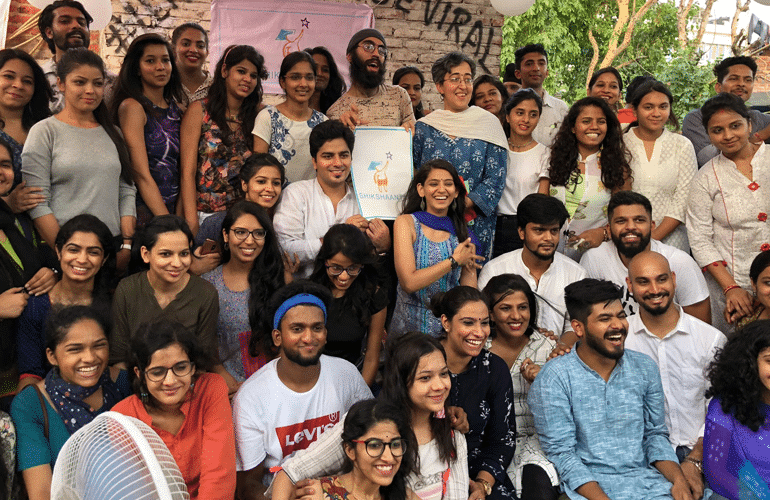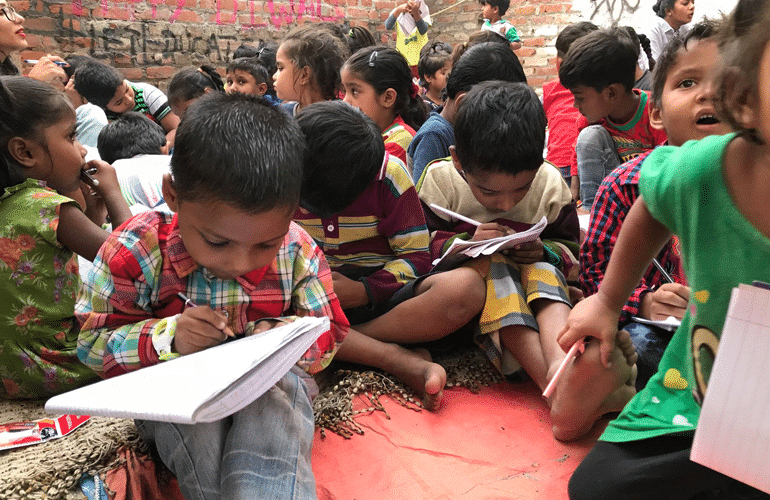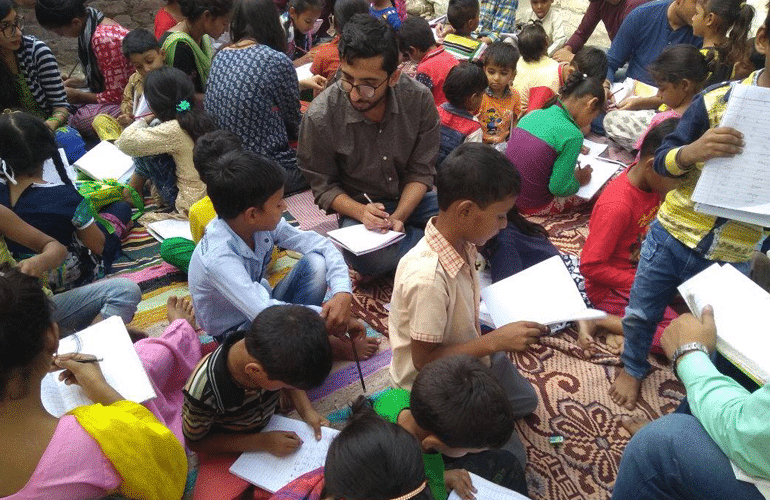These young guns believe in the idea of activism, not tokenism. Hence they started their initiative with a firm belief “Each one teach one”. Unlike a few NGOs which urge people to donate money, this one asks others to donate their time and change the lives of underprivileged kids through education.
Four years back, in 2015, a team of young professionals and students selflessly came forward to change the fate of children from the disadvantaged section of the society by providing them basic education.
Akash Tandon, one of the founding members of Delhi’s Pehchaan – The Street School, in an exclusive conversation with Life Beyond Numbers, tells us why more than an initiative, Pehchaan is just a beautiful thought to help underprivileged slum children get back their identity.

It was behind the high-rise WHO (World Health Organization) building in Delhi, we came across a slum which stayed put for decades without having the privilege of basic necessities. “This was such a stark contrast that everyone from the metro station looks at it but choose to ignore this section of society. We knew that we had to do something about it and that is how the thought of empowering these children with education took shape,” says Akash.
Little Support and a lot of Love
While the city’s privileged kids were getting to study in a proper classroom (probably AC classroom), guided by good faculty and equipped with all possible facilities, but for Pehchaan, the first class was conducted in a temple.
Pehchaan completed 4 years of hope and smile in 2019
Akash says, “Usually, in the evening, temple premises are empty, so we were allowed to take classes there. In the beginning, few parents from the Muslim community were skeptical about sending their children to study here, but when they started understanding the process and value of free education, they accepted it.”
“Initially, we never believed in the idea of forming an NGO, and for 3 years were just an individual volunteer group, but because the number of students was increasing, convincing people to volunteer, encouraging students to join us and getting stationaries for them became difficult. Hence, we got this organization registered in 2018.”

“To educate a man in mind and not in morals is to educate a menace to society,” Thomas Roosevelt once said that. Pehchaan doesn’t only provide basic education to these children over the weekends, it teaches them ethics and etiquettes as well. Be it elementary education or drawing, everything is done with the utmost care by these selfless volunteers. Here, the children also have the freedom to learn whatever they want, which makes this school quite appealing to kids. “We started with 5 volunteers and 10-15 kids in the beginning, now we have more than 80 volunteers and 500+ registered students with us,” says Tandon.
So, what’s stopping parents of these slum kids to send them to a school?
On asking whether parents of children living in poverty are skeptical about sending their children to school and providing them with basic education, Akash says, “I have come across 500 families but haven’t yet met any parent till date who don’t want to educate their children. There are numerous problems which they face on a daily basis which we are not aware of. It is not that they fail to understand the importance of education, but certain circumstances force their kids to stay at home.”
To put this into perspective, Akash recalls, when he and his team approached a family and asked them to send their child to school, the parents refused because both were working and without the elder girl child looking after the younger sibling, the parents couldn’t go to work.

“When children do not have access to education, they get addicted to wrong habits such as stealing and robbery. We wanted to give these children something better to look forward to. Earlier, these children used to fight and shout and play and were least interested in studies, slowly things are changing for better and with time, we have also realized how to bond with them and bring the best out of these kids,” says Tandon.
In 2018, the Supreme Court of India ruled that Aadhaar is not compulsory for school admissions. Neither is it mandatory for CBSE, NEET and UGC examinations and yet many schools fail to admit children when the parents of these kids fail to produce Aadhaar.
The selfless work team Pehchaan is doing has a message for all, “It doesn’t matter if you are not able to donate money to these slum kids, donate time for the education of these children. It might seem like a small effort in the beginning, but we don’t see the bigger picture here. We are not only gifting education to a single child and the power to meet their own needs, but we are also making an impact on the generations to come.”
To name a few, the NGO has centers in areas like Kishan Kunj, Laxmi Nagar, Indraprastha Metro Station, Kirti Nagar Metro Station, Satguru Ram Singh Marg Metro Station, Noida, and Dehradun.
How you can help
No one ever became poor by giving.
You can help break the cycle of poverty by supporting children’s education and bring a huge difference in their lives. By contributing to Pehchaan’s cause, you can make a child believe that they aren’t alone in this world. A bunch of optimistic youngsters has put in efforts to make a difference in the lives of these innocent children.
- Volunteer: You can volunteer for free at any of their centers and be a reason for the children to smile.
- Become a Sponsor: Sponsor a child’s education for an entire year, which shall include books and stationeries.
- Adopt a Child’s Education: This includes taking full funding responsibility for a child’s education for his/her schooling, from primary to higher secondary education
- Donations: Every bit counts! Donations in the form of uniforms, books, stationery, boards, desks, educational toys are accepted and appreciated.
Bringing a smile on those little faces will surely bring a smile to your face too.
Gift at least one child the power of education.
We can’t agree more with the famous American philosopher and educational reformer John Dewey’s words- Education is not preparation for life, education is life itself.

